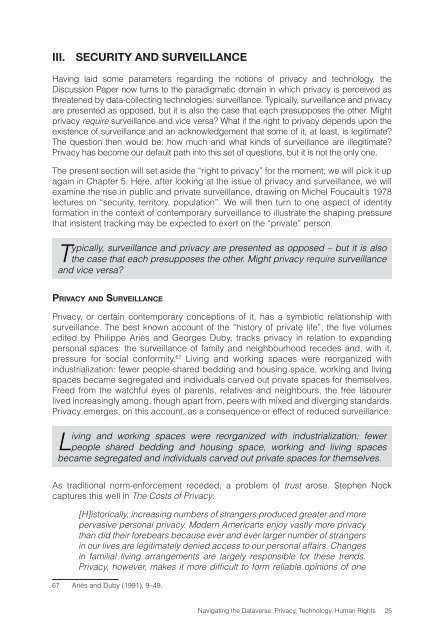Navigating the Dataverse: Privacy, Technology ... - The ICHRP
Navigating the Dataverse: Privacy, Technology ... - The ICHRP
Navigating the Dataverse: Privacy, Technology ... - The ICHRP
Create successful ePaper yourself
Turn your PDF publications into a flip-book with our unique Google optimized e-Paper software.
III. Security and Surveillance<br />
Having laid some parameters regarding <strong>the</strong> notions of privacy and technology, <strong>the</strong><br />
Discussion Paper now turns to <strong>the</strong> paradigmatic domain in which privacy is perceived as<br />
threatened by data-collecting technologies: surveillance. Typically, surveillance and privacy<br />
are presented as opposed, but it is also <strong>the</strong> case that each presupposes <strong>the</strong> o<strong>the</strong>r. Might<br />
privacy require surveillance and vice versa? What if <strong>the</strong> right to privacy depends upon <strong>the</strong><br />
existence of surveillance and an acknowledgement that some of it, at least, is legitimate?<br />
<strong>The</strong> question <strong>the</strong>n would be: how much and what kinds of surveillance are illegitimate?<br />
<strong>Privacy</strong> has become our default path into this set of questions, but it is not <strong>the</strong> only one.<br />
<strong>The</strong> present section will set aside <strong>the</strong> “right to privacy” for <strong>the</strong> moment; we will pick it up<br />
again in Chapter 5. Here, after looking at <strong>the</strong> issue of privacy and surveillance, we will<br />
examine <strong>the</strong> rise in public and private surveillance, drawing on Michel Foucault’s 1978<br />
lectures on “security, territory, population”. We will <strong>the</strong>n turn to one aspect of identity<br />
formation in <strong>the</strong> context of contemporary surveillance to illustrate <strong>the</strong> shaping pressure<br />
that insistent tracking may be expected to exert on <strong>the</strong> “private” person.<br />
Typically, surveillance and privacy are presented as opposed – but it is also<br />
<strong>the</strong> case that each presupposes <strong>the</strong> o<strong>the</strong>r. Might privacy require surveillance<br />
and vice versa?<br />
<strong>Privacy</strong> and Surveillance<br />
<strong>Privacy</strong>, or certain contemporary conceptions of it, has a symbiotic relationship with<br />
surveillance. <strong>The</strong> best known account of <strong>the</strong> “history of private life”, <strong>the</strong> five volumes<br />
edited by Philippe Ariès and Georges Duby, tracks privacy in relation to expanding<br />
personal spaces: <strong>the</strong> surveillance of family and neighbourhood recedes and, with it,<br />
pressure for social conformity. 67 Living and working spaces were reorganized with<br />
industrialization: fewer people shared bedding and housing space, working and living<br />
spaces became segregated and individuals carved out private spaces for <strong>the</strong>mselves.<br />
Freed from <strong>the</strong> watchful eyes of parents, relatives and neighbours, <strong>the</strong> free labourer<br />
lived increasingly among, though apart from, peers with mixed and diverging standards.<br />
<strong>Privacy</strong> emerges, on this account, as a consequence or effect of reduced surveillance.<br />
Living and working spaces were reorganized with industrialization: fewer<br />
people shared bedding and housing space, working and living spaces<br />
became segregated and individuals carved out private spaces for <strong>the</strong>mselves.<br />
As traditional norm-enforcement receded, a problem of trust arose. Stephen Nock<br />
captures this well in <strong>The</strong> Costs of <strong>Privacy</strong>:<br />
[H]istorically, increasing numbers of strangers produced greater and more<br />
pervasive personal privacy. Modern Americans enjoy vastly more privacy<br />
than did <strong>the</strong>ir forebears because ever and ever larger number of strangers<br />
in our lives are legitimately denied access to our personal affairs. Changes<br />
in familial living arrangements are largely responsible for <strong>the</strong>se trends.<br />
<strong>Privacy</strong>, however, makes it more difficult to form reliable opinions of one<br />
67 Ariès and Duby (1991), 9–49.<br />
<strong>Navigating</strong> <strong>the</strong> <strong>Dataverse</strong>: <strong>Privacy</strong>, <strong>Technology</strong>, Human Rights 25
















